Useful and harmful properties of dill for the human body
Dill known as a condiment for various dishes. It is added to salads and hot dishes for a special aroma and taste. However, dill is not just a seasoning. It has many useful properties that are actively used in folk medicine and cosmetology. Dill can be found on the site of almost every gardener, but not everyone knows about its useful properties and application possibilities.
Content:
- The composition and useful properties of dill
- Application in traditional medicine
- The use of dill in cooking
- Harm and contraindications
- Selection tips and storage methods
The composition and useful properties of dill
Dill is not only healthy, but also low-calorie plant. Energy value per 100 g of herb is only 40 kcal. For this reason, dill is actively used in dietary nutrition. It is very simple to grow dill on the site, but there are many benefits from it. Dill is consumed in its pure form, dried, added to marinades and pickles.
The beneficial properties of dill for the human body have long been known. It was used not only for food, but also for the treatment of various diseases. Dill contains:
- Vitamin A. It is a vital antioxidant. It is essential for health and beauty. Vitamin A strengthens the skin, hair and nails, maintains vision, and strengthens the immune system. It is recommended to use this vitamin in the form of food, since this way it is better absorbed by the body.
- Vitamins of group B. Vitamins of this group are involved in cellular metabolism and are very useful for the body. Each of them has its own biological significance. Experts confirm the benefits of B vitamins for the nervous system. They help protect against stress and also prolong the youthfulness of the skin.
- Vitamin E. Tocopherol is a powerful antioxidant that protects cells in the body from free radicals. Also, vitamin E normalizes the level of sex hormones in the body, helps to normalize the reproductive system.
- Beta carotene. It is a plant pigment that strengthens the immune system. Its benefits for the cardiovascular system are undeniable. Beta-carotene decreases the likelihood of developing strokes and heart attacks.
- Vitamin PP. This vitamin has a beneficial effect on the digestive system, helps the body resist stress, and lowers blood cholesterol levels.
- Sodium. Sodium maintains a normal water-salt balance in the body, promotes normal kidney function, and normalizes neuromuscular conduction.
Dill is also rich in other vitamins and minerals. It has a pronounced bactericidal property, enhances immunity, and promotes overall strengthening of the body.
Application in traditional medicine
Traditional medicine is rich in recipes, among the ingredients of which is dill. The most popular are dill seeds, fresh and dried. They are high in flavonoids and essential oils. It is especially often recommended to take dill seeds for women to restore lactation and normalize the menstrual cycle.
Dill in folk medicine is used in the following cases:
- With diseases of the respiratory system. Fragrant dill has excellent anti-inflammatory properties.For diseases of the throat, upper and lower respiratory tract, ARVI, dill can be chewed, drink decoctions from it, and inhaled. Dill not only stops the inflammatory process, but also removes the phlegm accumulated in the bronchi.
- With diseases of the genitourinary system. Dill seeds normalize kidney function, and also help to normalize the level of sex hormones. Women with the help of a decoction of dill treat dysmenorrhea and other menstrual irregularities.
- With diseases of the gastrointestinal tract. Dill is a well-known carminative. With bloating, a decoction of dill seeds helps to quickly solve the problem, remove gases. Such a remedy is recommended even for infants with colic.
- With violations of lactation. If the amount of milk decreases during lactation, dill will help increase milk production. For a child, the grass is harmless.
- With eye inflammation. Traditional medicine recommends a remedy with dill seeds for fatigue and redness of the eyes. The seeds are boiled in gauze, cooled and applied to the eyelids for 15-20 minutes. It is believed that this procedure also smoothes fine wrinkles.
- Dill also helps with skin diseases. For example, lotions and masks are made from the broth, which relieve inflammation from the skin, fight acne. If there are boils and abscesses on the skin, apply fresh dill gruel to the affected skin. After such procedures, the likelihood of scarring is reduced. With a decoction of dill, you can wash wounds and abrasions so that they do not fester.
The use of dill in cooking
It is difficult to imagine a more popular and widespread spice than dill... This plant adds a special delicate aroma to dishes, goes well with vegetables, meat, fish. In cooking, dill is used almost everywhere:
- When making marinades for meat, dill pickles are added to add spice and flavor.
- Fresh and dried dill is added to soups, cabbage soup, borscht.
- Dill is often served with meat. In this case, you can use dried dill, adding it at the end of the preparation of the dish, or fresh, which is sprinkled after serving.
- Any sauce will be tastier if you add some seeds or fresh dill herbs.
- Dill is also used in baking. It complements well unsweetened pastries: pies, tortillas, meat pies, pizza.
- Aromatic oil is also obtained from dill, which is used by culinary specialists. If you choose high-quality oil, it can be used as a substitute for dill in the cold season, when it is difficult to find fresh.
It is worth remembering that the benefits are preserved only fresh and dried. If dill has been cooked for a long time, it loses its beneficial properties, and the aroma becomes much weaker.
Harm and contraindications
There are practically no contraindications for the use of dill. Rarely, but there is an individual intolerance to this plant. Before using medicines based on it or eating it, it is worthwhile to test for an allergic reaction.
Dill can be taken during pregnancy. In a small amount in dishes, it will only benefit. But you should not abuse this spice while carrying a child.
It is also worth taking dill decoctions with caution during menstruation - dill tends to thin the blood, which can increase bleeding.
Dill normalizes the cardiovascular system and lowers blood pressure. For this reason, hypotensive patients need to be careful when consuming large quantities of dill.
Selection tips and storage methods
Any fresh greens must be stored correctly so that they do not deteriorate for a long time. But first you need to choose the right one. In the store, you need to choose only fresh dill, which smells strong. If the aroma is already weak, and the greens have wilted, such dill will not be stored for a long time. It is worth remembering that the presence of damage and dark spots on the greenery significantly reduces the shelf life.
When buying, you should pay attention to the color of the leaves - they should be green, saturated, without darkening and traces of wilting.
If the leaves stick together, it is better to refuse to buy such dill. Even frozen dill should be bright green and look fresh. The presence of yellowed leaves is not allowed. You need to buy dry dill. If the leaves are wet, the greens will quickly deteriorate and rot. It should be washed only before use.
You need to store dill as follows:
- First, the dill needs to be prepared for storage. If there are damaged or withered branches in the bunch, they must be removed and separated from fresh greenery. They will not be stored and will not add any special flavor to the dishes.
- Fresh dill can be stored in the refrigerator or placed in a small jar of water. So fresh dill will stand for 2-3 days and retain its aroma and taste.
- Greens can be stored in a container, but there should be openings for air ventilation. In this form, dill will stay in the refrigerator for a week and will not lose its properties.
- If you need to keep the dill for even longer, a month or two, you first need to rinse and dry it, then chop it finely and store it in a glass jar.
- It is believed that dill will stay in the refrigerator for longer if you put a bag with half a fresh onion in a bag with a half of a fresh onion if you do not wash the greens. The bulb must be constantly renewed so that it does not lose its properties.
- It is easiest to store in winter dill in dried form. Dried dill does not require special storage conditions. It is enough to protect it from moisture.
More information can be found in the video:




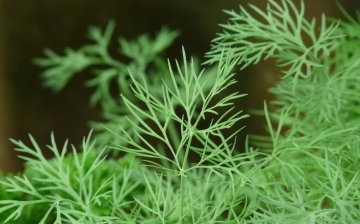
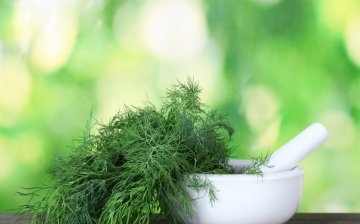
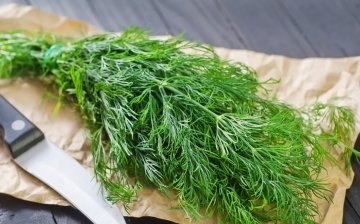

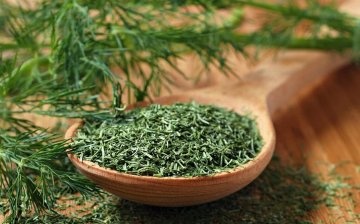






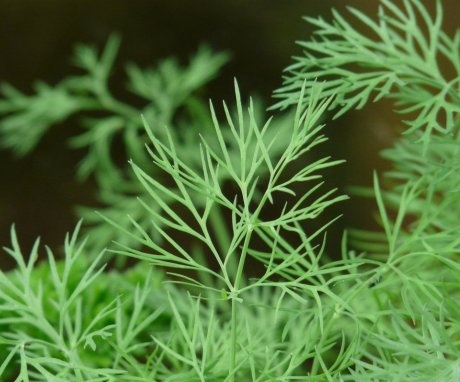
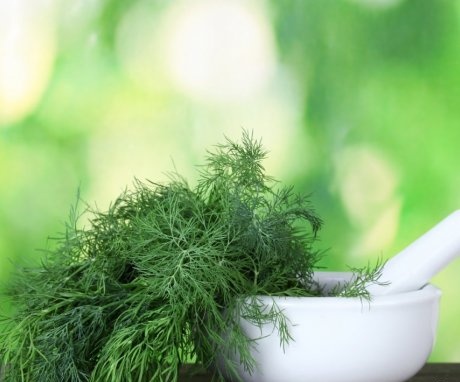
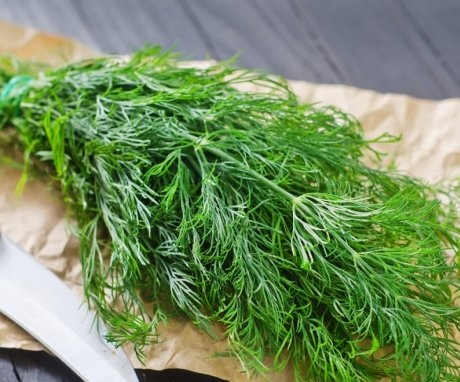

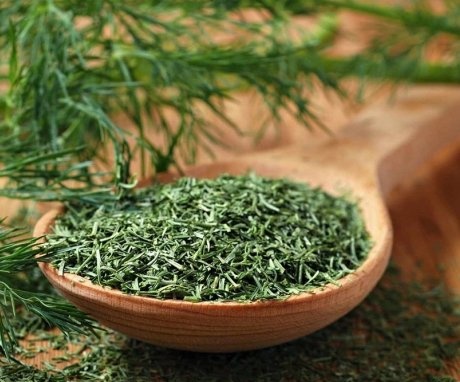
I love dill very much, I add it everywhere, fortunately, now you can buy it in the store at any time of the year. True, in winter it is not very fragrant, but for such cases I freeze a box or two for the winter.
I love dill very much, its aroma is able to revive and decorate any dish. I kept it dry before, but now I wash it, dry it, cut it into a container and ice it. In this form, it is perfectly stored all winter and does not lose its properties, aroma and vitamins.
And I cut the dill finely, sprinkle it with salt and store it in the refrigerator. I add it to soups, its aroma remains as fresh. I also use dill water to wipe my face. I cook it like this, I insist the dill in warm water, then I take it out, and pour the broth into molds and into the freezer.
Dill always grows spontaneously in our garden, we never plant it on purpose. We actively use it in fresh food, in marinades, in dried form as blanks, and also began to freeze in containers.
Dill, in my opinion, cannot be harmful. He has a lot of useful properties. In the summer I constantly buy it and add it to all soups, salads and preserves. I love it very much for its pleasant aroma.